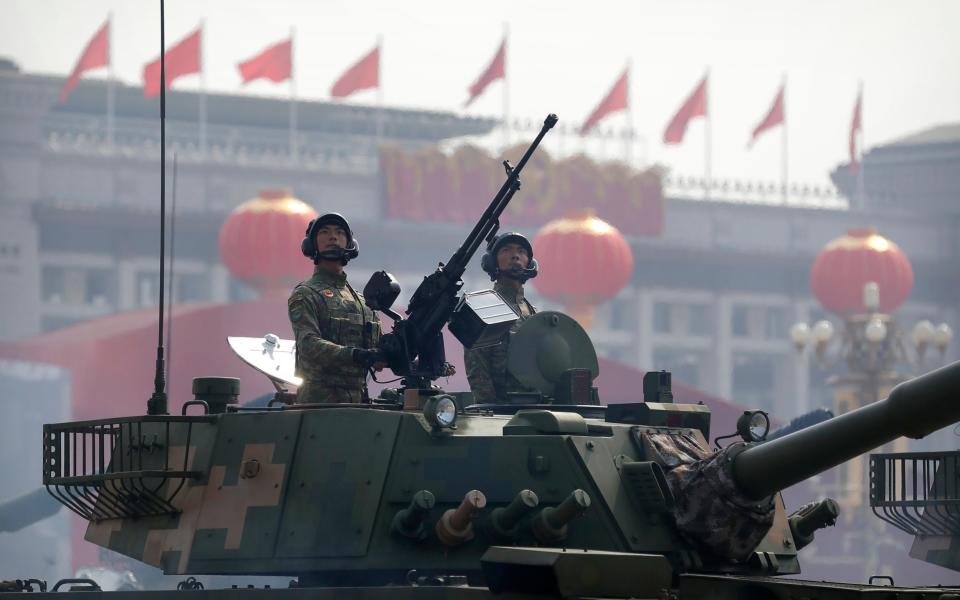Revealed: the worrying links between Huawei, our universities and China

With its cast iron replica of Budapest’s Liberty Bridge and its pale-stoned version of Versailles, visitors to Huawei’s research centre in Dongguan could be forgiven for thinking they were in Europe.
It is a benign – if eccentric – tribute. But other attempts to forge close ties to the Western culture have much more serious implications.
The Telegraph can disclose today that the controversial Chinese telecoms giant backed 17 scientific papers with UK universities, about cutting-edge “dual use” technologies – which can have civilian applications but can also be used in military technology.
At least 15 of the papers focused on technology that experts claim could be used to communicate with swarms of drones or on highly advanced image recognition software that experts claim could be used for extreme levels of surveillance.
All of them involve collaborations between British universities, including at Edinburgh and Exeter, and Chinese universities heavily involved in military research and named as "high risk" by an Australian think tank.

The Telegraph’s findings today will raise fresh concerns over Huawei’s influence in Britain. Experts have also warned that Beijing may be using Huawei and UK universities to advance China’s defence programme, and a surveillance regime that is known for its human rights breaches.
Alex Joske, a China expert at the think tank - the Australian Strategic Policy Institute - said: “Chinese military universities are collaborating with western institutions to take advantage of their expertise, resources and training in order to advance China’s military technology.”
In one instance, academics at the University of Kent accepted Huawei funding for joint research on tiny antennae which, according to experts commissioned by The Telegraph, could “get a swarm of drones to communicate with each other”.
The study was done jointly with a known defence laboratory at the University of Electronic Science and Technology in Chengdu.
A spokesperson for Kent said that the paper "has military as well as civilian applications just as many other engineering areas", that it respects all UK trade restriction and that its students always declare any support from Huawei.
Both Edinburgh and Exeter Universities said that the projects with huawei had undergone rigorous due diligence processes and ethical review and were reviewed on an ongoing basis. Huawei has strongly disputed analysis of the papers by three experts, and insisted that the technologies they focused on were all “common areas of research for telecoms equipment suppliers”.

A spokesman said: “Huawei is a private company that supplies telecoms companies globally. We do not conduct military research either directly, or indirectly, nor do we work on military or intelligence projects for the Chinese government or any other government”.
It said Huawei had "strict rules stipulating research and development cooperation with universities must be for the sole purpose of product development for civilian use", and dismissed the Australian think tank as having an "anti-Huawei agenda"
It also dismissed ASPI's findings, claiming that the Australian think tank has an “anti-Huawei agenda”.
However, fears are growing that research undertaken as part of these collaborations will be passed to Beijing.
There they could be used to bolster China’s extreme surveillance operation in Xinjiang, the western Chinese province where the Chinese government has imprisoned over 1 million ethnic Uighurs.
Experts also fear that British academics may unwittingly find themselves working on technologies that are used to bolster China’s declared ambition to become the most advanced military power in the world by 2049.
Last night, experts called for a shake-up of funding rules to ensure this does not happen.
Professor Anthony Glees, director of the centre for security and intelligence studies at the University of Buckingham, called for universities to disclose funding deals, and a ban on UK institutions accepting Chinese backing for technology research that could be used in warfare.
“It should be illegal to accept funding from China in areas where there is a military or national security relevance,” he said.
Charles Parton, senior associate fellow at defence and security think tank RUSI, said: "Research collaboration with China is not going to be black and white. We are talking about fifty shades of grey, and it is the government's role to set up a mechanism for deciding and ruling which shades of grey are acceptable.”

Most universities have ethics boards to oversee funding, but there are currently no national standards for vetting funding before research takes place. The standard practice is for academics to declare their research partners and funding sources upon publication.
In the US, universities are forced to declare any benefits or contracts worth over $250,000-a-year (£202,000) with “a foreign source”. In Europe, the European Code of Conduct for Research Integrity demands that “researchers review” funding submissions “in a transparent and justifiable manner”.
The scientific papers backed by Huawei and examined by The Telegraph were produced jointly with Chinese universities with specialisms in defence technology, which are ultimately controlled by Beijing or its military.
The Telegraph commissioned three experts – with specialisms in military technology and artificial intelligence - to examine 18 publicly available studies undertaken jointly by UK universities and Chinese defence institutions.
At least 17 of the studies were “dual-use”, so could be used for civilian services as well as for warfare or for extreme levels of surveillance. Experts were split on whether the eighteenth was also dual-use.
Toby Walsh, professor of artificial intelligence at Australia’s University of New South Wales, said academics need to ask “tougher, more demanding questions” about their research partners because “the same algorithms you use to unlock your smartphone are now potentially being used to help kill people.”
Bart Selman, professor of computer science at America’s Cornell University, said that a number of the papers were about technology that would allow better communication between “swarms of drones”.
Another specialist – an expert on military technology who declined to be named for fear of repercussions – said that it is “almost impossible to deny a pattern of research” across the papers that could build up China’s “repressive technology capabilities”.

All of the papers were backed by Huawei in some way – half through direct funding, and nearly all by Huawei researchers working on them.
Five of the 18 papers were joint projects with China’s National University of Defence Technology – the in-house university of the People’s Liberation Army.
Ten were done with Chinese universities that are part of Beijing’s “Seven Sons of National Defence” institutions, which are tasked with advancing China’s defence industry and are controlled by the Ministry of Industry and Information Technology.
The remaining three were co-authored by academics in known Chinese defence laboratories. Some of the Chinese universities also face sanctions from the US and Japan because of their relationships with China’s military.
One 2019 paper, called “Unequal Error Protection SCMA Codebooks”, was a joint project between the University of Surrey, Huawei and the National University of Defence Technology. Experts said it could reduce power usage while helping communications between drones.
A spokesman for the University of Surrey, said Huawei was one of five supporters of its 5G Innovation Centre, which researches “machine to machine communications – commonly known as the Internet of Things. This research paper, alongside hundreds of others on the same topic publicly available around the world, looks at this important application of 5G technologies”.
The experts who examined the studies also highlighted a paper by academics at Lancaster University and the University of East Anglia (UEA), who worked with scientists from Huawei and Beihang University, a Chinese institution that sanctioned by the US for its extensive work on rockets and drones.
The 2017 study – “Recognition Using 3D Histograms of Texture and A Multi-Class Boosting Classifier”– involves programming cameras or drones that can recognise human actions which, according to all three experts, is useful both for video surveillance and developing autonomous weapons. Dr Walsh called the paper “troubling”.
The Lancaster academic – Jungong Han – who worked on the paper in question insisted that the research had no military application, was “completely done in China”, and that his role was to provided “feedback on paper writing”. He added that Huawei might not have even known that its researcher was involved.
A spokesman for Lancaster University said that the university did not receive Huawei funding for the paper and that it has “multiple potential applications”. “Our researchers are free to work with their counterparts in universities around the world,” he said.
A spokesman for UEA said that the researcher involved in the work has since left the university and that it was “was likely begun before [the researcher] arrived at UEA.

 Yahoo News
Yahoo News 